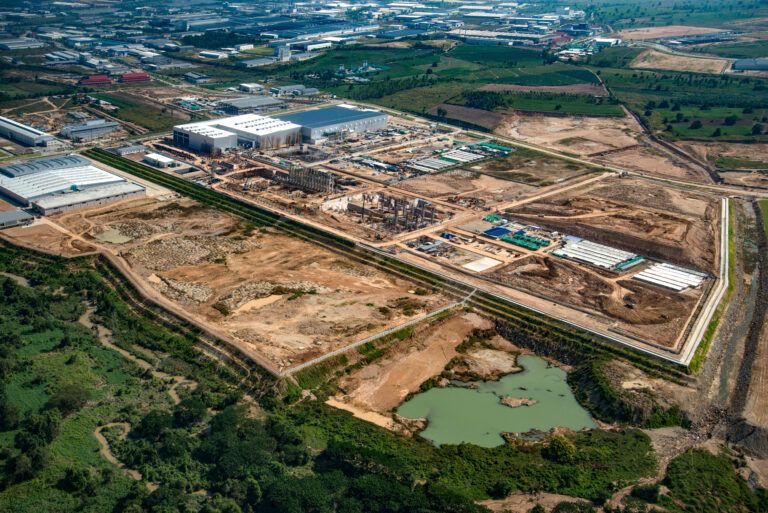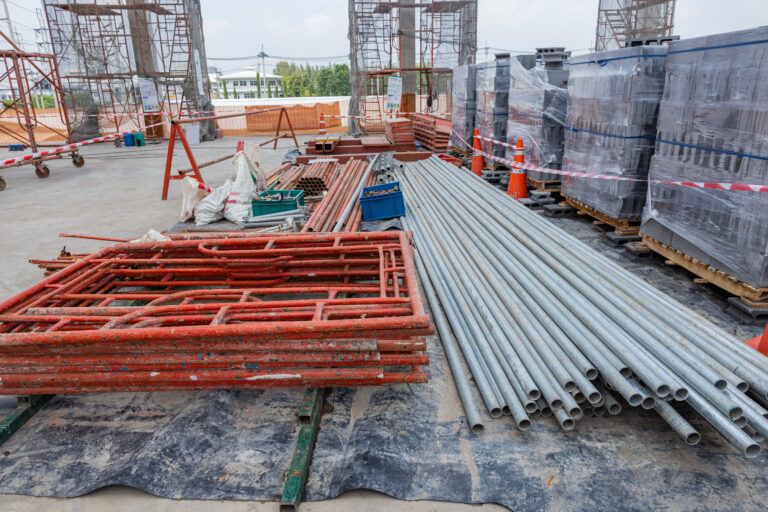Thinking about a career that blends creativity with practicality, and where every day brings a new challenge? Civil and structural engineering might just be the path for you. This field is not just about blueprints and concrete; it’s about creating the backbone of society, from skyscrapers that touch the clouds to bridges that span vast rivers.
It’s a career where your work directly impacts the community, ensuring safety, efficiency, and sustainability. With a mix of innovation and a dash of problem-solving, civil and structural engineers are the backbone of industrial development. Whether you’re drawn to designing robust processing facilities or you’re passionate about sustainable industrial solutions, this guide is your first step towards a fulfilling career in civil and structural engineering.
This guide is your first step toward a fulfilling career in civil and structural engineering, discovering how to turn your passion into a profession, from the essential qualifications to the diverse career paths and beyond. Let’s build your future, one project at a time.
Why Choose a Career in Civil and Structural Engineering?
Choosing a career in civil and structural engineering is a decision that aligns with a deeply impactful and rewarding professional path. This field stands at the crossroads of innovation, sustainability, and societal development, making it a pivotal area for those looking to make a significant difference in the world. Civil and structural engineers are the architects of our infrastructure; they design and oversee the construction of buildings, bridges, roads, and other critical structures that form the backbone of our communities.
This translates to strong job prospects and career stability for those in the field. Furthermore, the global nature of many engineering projects offers opportunities for international work experiences, broadening one’s professional and cultural horizons. In summary, a career in civil and structural engineering offers the chance to make a lasting impact on the world, engage with a variety of challenging and rewarding projects, and enjoy a stable and prosperous professional life.
It is an ideal path for those who are passionate about building a better future and are eager to be at the forefront of solving some of the most pressing challenges facing our planet.
High Demand for Infrastructure Development
The global landscape is experiencing an unprecedented need for innovative infrastructure development. Urban populations are expanding at a rapid pace, and the impacts of climate change are becoming more evident with each passing day. This has led to a heightened demand for sustainable and resilient infrastructure solutions.
Civil and structural engineers are at the forefront of this challenge, tasked with designing and executing projects that balance today’s requirements with the sustainability needs of future generations. The result is a robust job market for engineers, brimming with opportunities ranging from the construction of eco-friendly buildings to the development of efficient public transportation systems, ensuring a high demand for their expertise.
Diverse Career Paths
Civil and structural engineering is characterised by its exceptionally diverse range of career paths. Engineers have the opportunity to specialise in various areas such as structural design, transportation engineering, environmental engineering, water resources, and geotechnical engineering, to name a few. This diversity not only allows professionals to align their careers with their personal interests and passions but also guarantees a dynamic and evolving work environment.
The interdisciplinary nature of many projects further enriches this experience, enabling engineers to broaden their skill sets and engage in meaningful collaboration across different fields. This diversity in career paths underscores the dynamic and adaptable nature of the profession.
Contribution to Society
One of the most compelling aspects of a career in civil and structural engineering is the profound contribution to society that comes with it. Engineers in this domain are pivotal in shaping the built environment, influencing the safety, well-being, and quality of life of communities worldwide. Their work encompasses a wide range of socially impactful activities, from ensuring access to clean water and designing earthquake-resistant structures to mitigating the effects of natural disasters and contributing to the reduction of global carbon emissions.
This work not only addresses some of the most critical challenges of our time but also offers engineers a sense of purpose and fulfilment, knowing their contributions have a lasting impact on society.
What Educational Qualifications are Needed?
To embark on a career in civil and structural engineering, a Bachelor’s degree in civil engineering is the foundational requirement. This degree should be obtained from a program accredited by the ABET (Accreditation Board for Engineering and Technology), ensuring the education meets the quality standards essential for the profession. For those aspiring to advanced positions or specialised fields within civil engineering, a Master’s degree offers deeper knowledge and expertise.
Specialisations can include areas such as structural engineering, environmental engineering, or transportation engineering, among others. These educational pathways equip aspiring engineers with the critical analytical skills, problem-solving abilities, and mathematical proficiency required to succeed in this challenging and dynamic field.
Bachelor’s Degree in Civil Engineering
A Bachelor’s degree in civil engineering is essential for anyone looking to enter the field. This undergraduate program lays the groundwork by covering critical topics such as materials science, structural analysis, and fluid dynamics, preparing students for the practical and theoretical challenges of civil engineering.
Accredited by ABET
Choosing a program accredited by CEAB is critical.CEAB accreditation is a mark of quality and ensures that the educational curriculum meets the high standards required for engineering professionals, facilitating a smoother transition into the workforce or advanced studies.
Master’s Degree for Advanced Positions
For career advancement and specialisation, a Master’s degree in civil engineering or a closely related discipline is highly recommended. This advanced degree offers deeper insights and knowledge, opening doors to leadership roles and specialised areas within the industry.
Specialisations in Structural, Environmental, or Transportation
Specialising in fields such as structural engineering, environmental engineering, or transportation engineering allows professionals to focus on specific areas of interest within the vast domain of civil engineering. Structural engineering focuses on designing resilient buildings and infrastructure, environmental engineering aims at developing sustainable solutions and minimising environmental impact, and transportation engineering enhances the efficiency and safety of transportation systems. These specialisations are pivotal in addressing the complex challenges of modern societies.
What Skills are Essential for Civil Engineers?
Mastering the essential skills needed for civil and structural engineering means developing a strong blend of analytical thinking and problem-solving abilities to design and carry out projects effectively. Proficiency in mathematics, including calculus and statistics, is fundamental, as these concepts are applied directly in engineering tasks. Project management skills are also crucial, encompassing budgeting, scheduling, and team coordination, to ensure projects are completed on time and within budget.
These skills combined enable civil engineers to tackle complex design and construction challenges, ensuring the safety and efficiency of infrastructure projects.
Analytical Skills
Analytical skills are paramount for civil engineers, enabling them to assess projects, interpret data, and make informed decisions. These skills are essential in identifying the most efficient and effective approaches to design and implementation.
Problem-solving in Design and Construction
Effective problem-solving capabilities are crucial in navigating the complexities of design and construction. Civil engineers use these skills to develop innovative solutions to engineering challenges, ensuring projects meet all safety and performance standards.
Mathematical Skills
Mathematical proficiency is a cornerstone of civil engineering, with calculus and statistics playing critical roles in the field. These areas of mathematics are directly applied in tasks such as structural analysis and hydraulic engineering.
Calculus, Statistics, and Application in Engineering
A deep understanding of calculus and statistics is vital, as these mathematical disciplines are integral to the application in engineering projects. They enable engineers to model and predict behaviour in structures and systems, ensuring reliability and efficiency.
Project Management
Project management skills are essential for overseeing the planning, execution, and completion of engineering projects. This includes budgeting, scheduling, and team coordination, ensuring projects are delivered on time and within financial constraints.
Budgeting, Scheduling, and Team Coordination
Mastery in budgeting and scheduling is critical for the successful management of projects, while team coordination ensures effective collaboration among diverse groups of professionals. These skills are key to the successful delivery of engineering projects.
How to Gain Practical Experience?
Gaining practical experience in civil and structural engineering is crucial for bridging the gap between academic knowledge and real-world application. Internships provide an invaluable opportunity for hands-on learning, offering exposure to project management, design processes, and construction practices under the guidance of experienced professionals. Offered by engineering firms and government agencies, internships allow aspiring engineers to apply their classroom knowledge in practical settings, enhancing their skills and understanding of the field.
Co-op programs further enrich this experience by integrating alternating semesters of education with work, enabling students to gain comprehensive insights and build a strong foundation for their future careers.
Internships
Internships are a pivotal step for students to immerse themselves in the practical aspects of civil and structural engineering. These opportunities are generously offered by engineering firms and government agencies, allowing students to apply theoretical knowledge to real-world projects.
Offered by Engineering Firms and Government Agencies
Internships available through engineering firms and government agencies provide a broad spectrum of experiences, from hands-on fieldwork to project planning and execution. This exposure is invaluable for understanding industry standards, networking with seasoned professionals, and gaining a competitive edge in the job market.
Co-op Programs
Co-op programs elevate the learning experience by seamlessly integrating academic studies with professional work. These programs are designed to offer alternating semesters of education and work, enriching students’ understanding and application of engineering principles.
Alternating Semesters of Education and Work
This unique structure of alternating semesters ensures that students not only gain significant practical experience but also continue to advance their academic knowledge. It’s an effective approach to prepare aspiring engineers for the challenges of the profession, offering a well-rounded foundation for a successful career.
Vista Projects: Building Engineering Careers
Vista Projects is an integrated industrial engineering and system integration firm with extensive experience serving the energy sector. The company specialises in digital transformation of industrial assets using a truth-based engineering approach, with particular expertise in green energy initiatives, including carbon capture, renewables, and energy efficiency projects.
We offer electrical engineers opportunities to work on complex industrial projects across petrochemical processing, mineral processing, and biofuels engineering. Our multidisciplinary approach combines traditional electrical engineering with cutting-edge system integration, providing you with exposure to innovative digital solutions and sustainable industrial development. With our international operations, we offer diverse project experiences in both traditional and emerging energy markets, giving you the chance to develop expertise across multiple sectors while contributing to meaningful energy transformation initiatives.
What are the Certification and Licensure Requirements?
Becoming a licensed Professional Engineer (P.Eng.) is a critical step for civil engineers, though requirements vary significantly by jurisdiction. In Alberta, Canada, where Vista Projects is headquartered, the process is governed by APEGA (Association of Professional Engineers and Geoscientists of Alberta) and typically begins with obtaining an Engineering-in-Training (EIT) designation after graduating with an accredited engineering degree.
After gaining four years of acceptable engineering experience under the supervision of a Professional Engineer, candidates can apply for Professional Engineer (P.Eng.) licensure. This licensure is essential for higher responsibility roles, such as leading projects, signing and sealing engineering documents, and taking professional responsibility for engineering work.
What are the Career Advancement Opportunities?
Career advancement in civil and structural engineering is marked by a progression into specialisation areas and leadership roles. Engineers can specialise in fields like geotechnical, water resources, or construction management, deepening their expertise and enhancing their value to employers. Leadership roles, such as project manager, senior engineer, or consultant, become accessible with experience and advanced qualifications.
These positions involve overseeing projects, guiding teams, and making strategic decisions, offering a pathway to significant professional growth and impact within the industry.
Specialisation Areas
Civil and structural engineers can advance their careers by specialising in areas such as geotechnical engineering, focusing on earth materials and their behaviour; water resources engineering, dedicated to managing water in natural and built environments; or construction management, which emphasises the planning, coordination, and control of construction projects from inception to completion.
Leadership Roles
As engineers gain experience and expertise, they can ascend to leadership roles within their organisations. Positions such as project manager, responsible for overseeing projects from planning through completion; senior engineer, who leads design and analysis efforts; and consultant, offering expert advice on complex engineering challenges, represent significant opportunities for career growth and impact.
What is the Job Outlook and Salary Expectations?
The job outlook for civil and structural engineers is positive, with an expected growth driven by the ageing infrastructure in many countries and the ongoing need for sustainable development projects. This growth ensures a steady demand for skilled engineers to design, construct, and oversee a wide variety of projects. Salary expectations vary by location, experience, and specialisation, but civil and structural engineers can anticipate competitive compensation that reflects the significance and impact of their work.
Advanced degrees and specialised certifications can further enhance earning potential, making this field not only rewarding in terms of career fulfilment but also in financial terms.
Job Growth Rate
The job growth rate for civil and structural engineers is anticipated to rise, primarily driven by the urgent need to refurbish and modernise ageing infrastructure worldwide.
Expected to Grow as Infrastructure Ages
This demand is expected to intensify as infrastructure continues ageing, necessitating substantial investments in sustainable and resilient construction projects to meet future challenges.
Average Salary Range
The average salary range for civil and structural engineers mirrors the essential nature of their roles, with compensation reflecting the complexity and impact of their work.
Varies by Location, Experience, and Specialisation
Compensation varies significantly by location, experience, and area of specialisation, with engineers in sought-after regions and those possessing niche expertise or advanced qualifications often earning higher salaries.
Building Your Engineering Career Foundation
The path to becoming a civil and structural engineer is both challenging and rewarding, offering the opportunity to shape the world around us through innovative infrastructure solutions. From obtaining your ABET-accredited bachelor’s degree to passing the FE and PE exams, each step builds upon the last to create a solid foundation for your engineering career.
Success in this field requires more than technical knowledge; it demands strong analytical thinking, effective project management skills, and the ability to adapt to evolving technologies and sustainability challenges. The practical experience gained through internships and co-op programs will prove invaluable as you transition from student to professional engineer.
With optimistic job growth projections and competitive salaries reflecting the critical nature of infrastructure development, civil and structural engineering offers both financial stability and personal fulfilment. Whether you choose to specialise in geotechnical engineering, pursue leadership roles, or focus on sustainable design solutions, the diverse career paths ensure opportunities to align your work with your passions.
As you embark on this journey, remember that every bridge designed, every building constructed, and every transportation system improved contributes to safer, more efficient communities. Your future career in civil and structural engineering positions you at the forefront of solving tomorrow’s infrastructure challenges while building today’s foundations for a better world.









